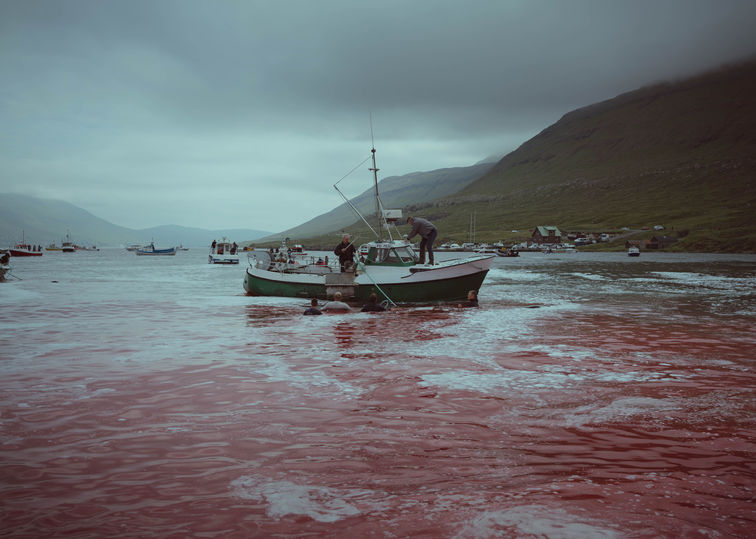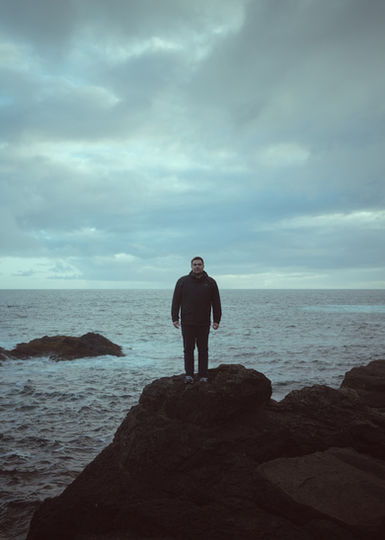
M E R C U R Y G E N E R A T I O N ( S )
During my first stay in the Faroe Islands, I was able to observe quite unique social and environmental issues in this territory of barely fifty thousand inhabitants. These isolated islands between Iceland and Norway are the cradle of a population in full mutation.
Sadly famous for its hunting tradition: the Grindadráp of black pilot whales "globicephala melas", I realized that in addition to this practice (dating for the first traces from the 16th century) still justified but on the contrary doomed to disappear is one of the bases of the History of this territory. The Faroes have been dependent on this meat for several centuries and this hunting has become over time a tradition synonymous with survival. In this extreme territory in winter and food sources being rare, the Faroese made their food reserves during the summer period with pilot whale, dolphin, mutton and fish meat that they still ferment today for the most part in order to preserve it longer. Unfortunately, controversies from foreign countries have further tarnished their reputation following the hunting of a group of 1,428 white-sided dolphins (a species usually rarely caught) in 2021. Which made this Grind the largest dolphin hunt in world history.
A food and ecological question arises around this subject: this pilot whale meat is the cause of several problems that affect the population of this archipelago to varying degrees. Indeed, it is polluted with mercury (Hg), a very toxic heavy metal that is also frequently found in nature but at very low concentration levels. The pollution of this meat mainly comes from human activities via gold panning using mercury as a separator or in various industries. At the top of the food chain, this mammal of almost half a ton that is the pilot whale fatally feeds on fish that are already very slightly polluted, it then becomes a mercury sponge and the 1,100 pilot whales killed on average each year (0.17% and 0.22% of the population in the North Atlantic) are enough to endanger the local population.
This observation and this link with this meat was proven by the generation of children 1986-87 with the research of Pál Weihe, a Faroese scientist who has been monitoring and testing for 35 years through the blood and hair of the inhabitants the concentration of mercury in their organism. Even today, he follows more than 3,000 people in the Faroes (6% of the island population). Through his research, he came to the conclusion that this meat is not (or is no longer because we do not know since when it has been) beneficial for humans and especially that it is very dangerous for pregnant women and children. It can cause malformations both cardiac but also at the level of the nervous system.
Sociologically, a tear in the population is created between anchored tradition and awareness. His research and his conclusions were, in fact, poorly received at the time. However, awareness has already been raised, pregnant women no longer consume it, consequently neither do children. The new generation grows up little with this meat and the idea of hunting it seems distant to them. However, in parallel and paradoxically, a new movement is emerging in this young generation which takes into consideration the fact of eating local with meat that has lived freely, is ethically better than meat imported by boat and contaminated with antibiotics. On the one hand, the Faroese no longer depend on this meat for their survival but on the other hand it remains anchored in everyone's customs. Today a "compromise" of one to two meals per month would allow the body not to be affected enough to develop underlying diseases.
NOTE:
The aim of this subject is to inform an audience in a neutral way on the scientific, biological and social aspects of this hunt which appears to us, with the information that reaches us as brutal, violent and endangering the hunted species. Unfortunately many things need to be clarified. On the one hand, the Faroese are not transparent about their hunting practice despite its progress but on the other hand activists do not hesitate to show only the violent side with often misinformation that reaches our media. Establishing a portrait of this practice seems essential, debating it and questioning our perception as well as our eating habits seems current in the period we are going through.
Since 2019 - Faroe Islands
captions by clicking on the images



















